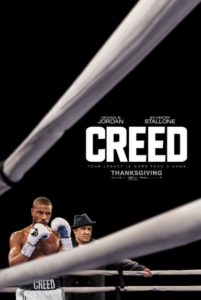
 “But you can’t buy what I’m gonna give you. I mean I’ve got pain and I’ve got experience.” Mickey pleads with Rocky, who’s mulling over an opportunity to fight the champ Apollo Creed. Back in 1976, this was the uncertain start of a cinematic boxing partnership, one that has lasted almost 40 years.
“But you can’t buy what I’m gonna give you. I mean I’ve got pain and I’ve got experience.” Mickey pleads with Rocky, who’s mulling over an opportunity to fight the champ Apollo Creed. Back in 1976, this was the uncertain start of a cinematic boxing partnership, one that has lasted almost 40 years.
If we’re lucky, our childhood heroes get older and grow with us. And like it or not, some fictional heroes over time take on a real life of their own. In the case of Rocky, I think of the character as an almost mythic athlete and less the fictional creation of Sylvester Stallone and Hollywood. The Rocky phenomenon has largely replaced the old David and Goliath story for millions, and Rocky came to embody the heart of the underdog.
But as the character was recycled— mainly for financial gain — the myth was tarnished. In the last installment in the franchise, the character was reduced in many ways to a video game, even a joke. Sure, I liked that fantasy in which Rocky came out of retirement to fight Mason “The Line” Dixon, played by real life fighter Antonio Tarver. But it was the character of Rocky as played by the chiseled Stallone that endured even at his cheesiest. And that character is well worth revisiting.
In “Creed,” the seventh film in the series, we meet Rocky Balboa again. The days in the ring are long behind him. His wife has passed away, his son has moved out of Philly to make it on his own away from the spotlight that Rocky’s fame created. Even Paulie is no longer around to taunt the brutish brawler once known affectionately as the Italian Stallion. And Rocky is at peace with his life, running a small restaurant named after his late wife. He’s content, but in his eyes, we see it, something missing, something left to be proven.
One day, a young man walks into Rocky’s restaurant. He’s lean and well-groomed. His accent hangs “I’m from out of town” around his neck. This young man is Adonis (Michael B. Jordan), a wannabe fighter who left a comfortable job in sunny LA in search of himself in the blood soaked meat grinder of the ring. We know he’s Apollo Creed’s son even before Rocky does, but when Adonis asks Rocky to train him, the flicker in Rocky’s eyes is there. Another chance presents itself to play the underdog, this time from the corner where Mickey once stood in for Rocky. The training style will be different, more humble, less threatening, but like Rocky’s pint sized mentor — caring and meaningful.
“Creed” is a film of pure theatrical joy. Sure, it is a cinematic creation in which time is compressed to a series of action packed montages and somewhat forced characterizations manifesting into moments of talk filled obvious speech-making. But by taking all the good will that was originally generated when “Rocky” won the Oscar for best picture and combining that with what little credibility remains in the character, co-writer/director Ryan Coogler (“Fruitvale Station”) packages together a tender, exciting and respectful film. “Creed” manages to be better than it ought to be. It transcends mere franchise and genre conventions becoming an artful project that aims to be its own film apart from those that came before it. I’m not overestimating the achievement here, “Creed” is a seriously good film even if Rocky had never been made.
And this is the magic —with “Creed” the character is honored with a thrilling human story and dramatic arch worthy of its origin and overcoming the hackneyed missteps that are now routinely lampooned. Perfect? Not by a long shot. But perfectly pitched to capture the zeitgeist that came to be a pop culture phenomenon? You betcha.
“Well, eh …, I eh …, I don’t …, I eh …, I’m 76 years old,” a broken and humbled Micky puts his head on the door to Rocky’s bathroom in his small apartment. He hears the toilet flush.
Stallone, who will likely find himself nominated for best supporting actor for his fine work in “Creed,” is now approaching 70 himself. And he knows Rocky, the guy who chased Mickey out into the street to hug him and form that forever ringside partnership. It is that tenderness that Stallone makes us remember and that tender sincerity that makes “Creed” an undeniable winner.
